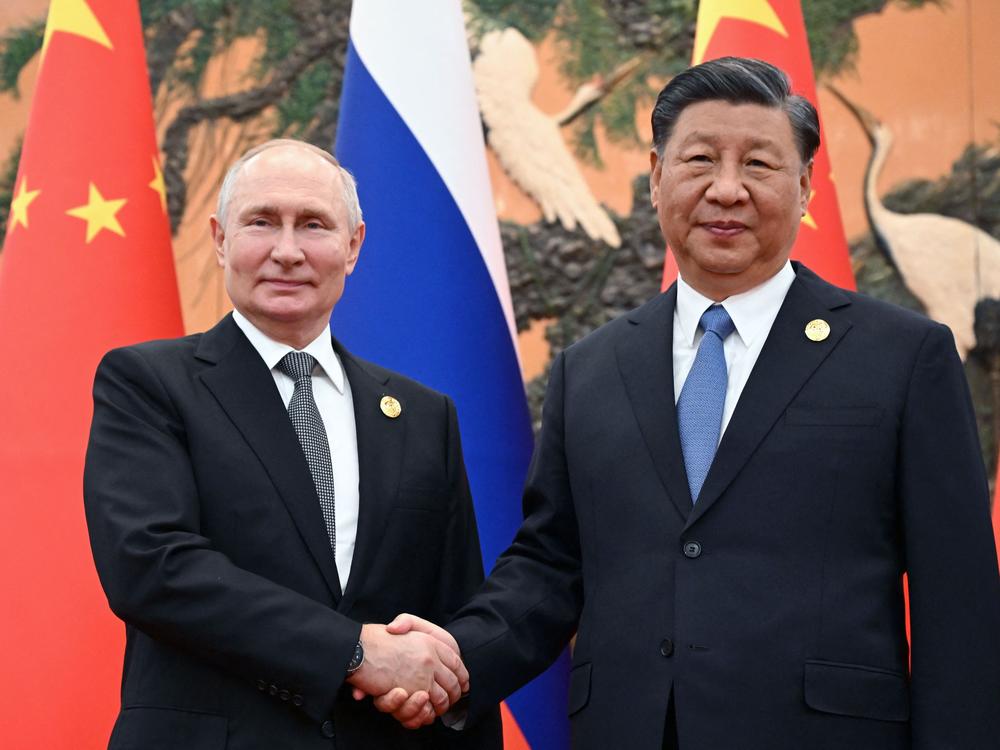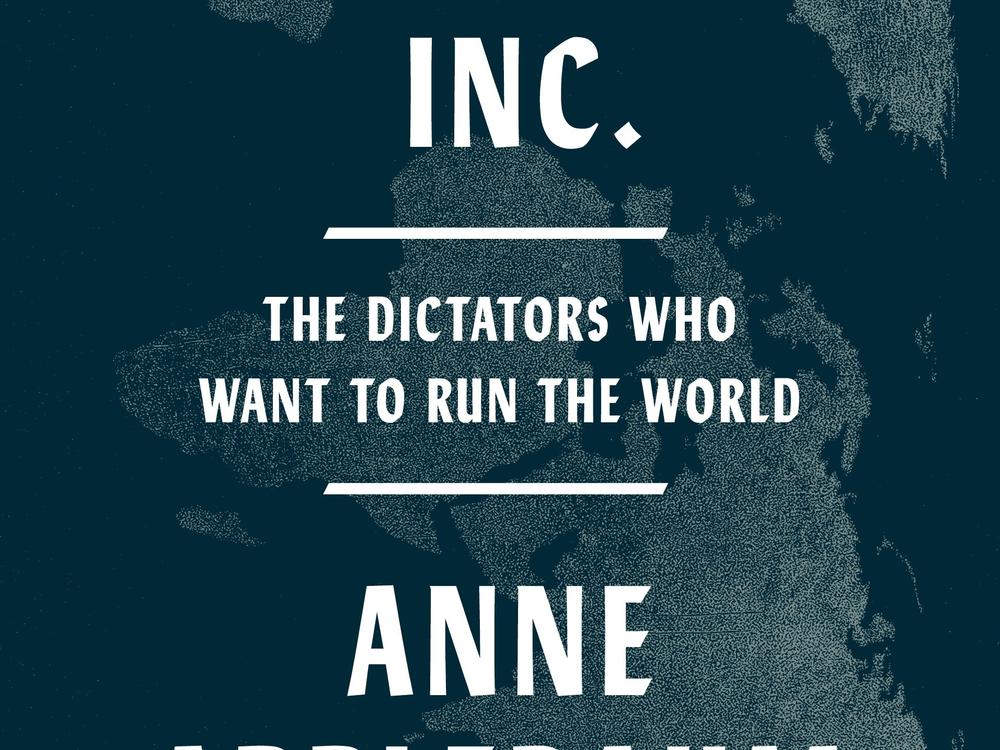Section Branding
Header Content
Expert on dictators warns: Don't lose hope -- that's what they want
Primary Content
When we think of dictators, often the image that comes to mind is of a lone strongman, whose main concern is holding power within his own borders. But Pulitzer Prize-winning journalist Anne Applebaum says today’s dictators are actually working together in a global fight to dismantle democracy.
In her new book, Autocracy, Inc.: The Dictators Who Want to Run the World, Applebaum describes a "network of convenience" that exists among various autocratic states, including Russia, China, North Korea, Turkey, Hungary and Venezuela among others.
"There isn't a secret room like in a James Bond movie where all the leaders meet; it's not like that," she says. "It's like a big corporation that has different companies, and each company does its own thing, but they have loose ties, and they cooperate when it's convenient."
Applebaum says alliances among the global autocracy center on issues of military influence, kleptocracy and defeating democracy — and she sees a link between former President Donald Trump these concerns.
"Simply being someone who's interested in using foreign policy to make money for oneself. I mean, that already makes Trump similar to a lot of Central Asian leaders or Africans, not to mention Putin," she says.
Looking forward, Applebaum says she hopes her book helps re-engage people who may have become cynical by the political process. "What the autocrats — whether they're in American politics or in Russian politics or in Chinese politics — what they want is for you to be disengaged. They want you to drop out," she says. "I want people to be convinced that ideas matter, that we're going to have to defend and protect our political system if we want to keep it."
Interview highlights
On how the Russian war in Ukraine is a war between autocracy and democratic world
In the last few years, [Putin] had begun talking about the end of the democratic world or the end of Democratic dominance. … The war was an attempt to show that he doesn't care anymore about the world that was created in 1945. He doesn't care about the UN charter. He doesn't care about UN documents and organizations that use the language of human rights. He doesn't care about the so-called unspoken rule or unwritten rule that we don't change borders in Europe by force. ... He's going to show that NATO is powerless, that it's a paper tiger, and that none of the international institutions can control him because he stands for a new order and a new future. And he has used that language. And his foreign minister, Sergey Lavrov, specifically said this war is about a new world order.
On how Putin set the example for leaders to use money to gain power
In my view, the rise of these new forms of autocracy were made possible by the nature of modern financial transactions. If you look closely at the rise of Putin … he began essentially by stealing money. He stole money from the city of St. Petersburg. He took it out of the country. He laundered it through Western institutions, brought it back in, and he and others, mostly in the former KGB who were doing this, eventually enrich themselves. And they enrich themselves using Western partners, Western companies, connections to the Frankfurt Stock Exchange.
They were enabled in this process by Western financial institutions — German, European, American. And, first of all, that gave them a certain cynicism about the Western world. So, "OK, you guys talk about democracy and transparency, but you're perfectly willing to help us steal." … You can see modern dictators also beginning to learn this, also beginning to understand they can use tax havens or they can filter their money through Western banks so that there are different ways of stealing and hiding money. And it's become something that people imitate really around the world.
On what she calls “information laundering”
I should start by saying that the autocratic world takes ideas very seriously and takes information seriously, and thinks a lot about how to get their message not just to us, but to Africa, to Latin America, to other countries around the world. They invest in it heavily. The Chinese have invested in a huge network of television and radio and website and newspaper and other forms of broadcasting in Africa, in Latin America, in Asia and elsewhere. They have content-sharing agreements with different newspapers around the world. Their wire service, Xinhua, is very cheap and easy to get hold of, very often cheaper than AP or Reuters. And they also think about how they can get information to people, in a way that they accept.
They have an idea that you want information to seem native, that it will seem local. And so they would rather have an African newspaper write something positive about China or write something negative about America, rather than it coming from a Chinese source. And the Russians in particular, have enthusiastically run with that idea. And they have also begun pretty systematically to create websites, newspapers and other forms of media that look like they are Ecuadorian or Peruvian or they're in Arabic, or they're in French. … And they look native. They're using local languages, but they rely on, as I said, on Russian narratives and especially on these authoritarian narratives about how about the degeneracy and decline of America in the West, about the superiority of autocratic states.
On an autocratic strategy that relies on lies to control the political narrative
Trump began his presidency with a lie about how many people had appeared on the National Mall for his inauguration. ... It was a very stupid lie. I mean, who cares how many people were in the National Mall? But he wanted the U.S. Park Service to lie about it, and he wanted his press spokesman to lie about it. And again, that was partly to show who's in control here? I'm in control, and I get to decide what the truth is. And it's also to confuse people and alienate them from politics. I mean, during the Trump administration, we spent a lot of time arguing about what was true and what wasn't. ...
Constant lies also create this kind of cynicism and apathy. It's a way of keeping people out of politics and preventing civic engagement. I mean, a lot of these authoritarian states know that ... [the] biggest threat to their power is their own people. And so their goal is to prevent people from ever organizing, from ever being engaged, from ever caring at all. And one of the ways they do that is through this constant stream of lies that make people feel like they're simply unable to know anymore what's true and what's not.
On how political arguments went from policy to culture wars
The way we did politics even 10 years ago, which was we argued about real things. Right? We argued about health care. We argued about infrastructure investment. … So that was the stuff that politics was supposed to be about once. Politics isn't about that anymore. Once it's about existential questions and identity, and once it's only culture wars which are easily exaggerated …. then you're in the realm where it's much easier for demagogues and for people who are good at evoking and creating emotion to win arguments. And I think it just took a long time for the opposition forces to understand how this works.
Sam Briger and Joel Wolfram produced and edited this interview for broadcast. Bridget Bentz and Molly Seavy-Nesper adapted it for the web.


